#NNPA BlackPress
Bill Pickett Invitational Rodeo provides rare glimpse at African American cowboys, cowgirls
NNPA NEWSWIRE — The main event – playfully named “The Greatest Show on Dirt” — is the rodeo itself. Thousands of spectators gather to watch black cowboys and cowgirls compete in eight major rodeo events. Among them (abbreviations intact): Bare Back Ridin’, Bull Doggin’, Calf Ropin’, Steer Undecoratin’, Barrel Racin’, Kid’s Calf Scramblin’, Relay Racin’, and Bull Ridin’. “Nobody ever leaves disappointed,” said Barbara “Miss Kitty” Love.
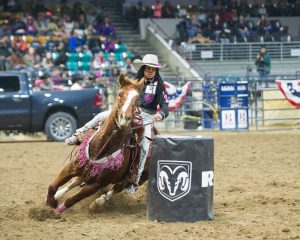
(Photo: Marvin Kelly)
By Lee Eric Smith, The New Tri-State Defender
lesmith@tsdmemphis.com
The Bill Pickett Invitational Rodeo saddles up at Agricenter International this weekend, showcasing some of America’s top African-American cowboys and cowgirls. And if you thought black folk don’t go to rodeos, let alone ride bulls and rope calves in them, you’re in for a treat – and a history lesson.
Long before #OscarsSoWhite became a thing, Barbara Love knew something was off. Like a lot of people, she grew up watching Westerns on TV and at the theatres. It was who she didn’t see that caught her attention.
“It fascinated me because television glorified the cowboy,” said Love, better known as “Miss Kitty” on the rodeo circuit. “I grew up on John Wayne, Gary Cooper and Henry Fonda. And I thought, ‘My great-grandfather ran a livery stable in Alabama.”
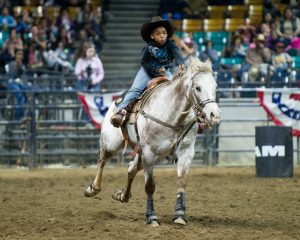
(Photo: Marvin Kelly)
“Why is it that all the cowboys are white?” she asked.
Of course, there were plenty of black cowboys. Cowgirls, too. Many of their names are forever lost to history, but one name still stands tall: William Pickett.
Born near Austin, Texas in 1870, Pickett’s list of accomplishments belongs in history books – he invented the “grab-‘em-by-the-horns” style of bull wrestling called bulldogging. He performed around the world, became the first black cowboy movie star and performed for the British Royal Family.
Picket died in 1932. And although he was enshrined in multiple halls of fame, it wasn’t until 1984 that a cowboy named Lu Vason launched the Bill Pickett Rodeo to pay homage to the iconic figure. Unfortunately, even in the 1980s, America needed a black rodeo for the same reasons Pickett never got the universal appreciation he deserved.
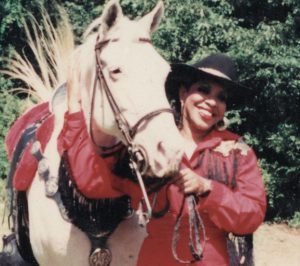
Miss Kitty with horse
“White rodeos really weren’t open to us,” Miss Kitty said. “Either black cowboys weren’t invited, or they weren’t scored fairly. That’s just how it was.”
These days, the Bill Pickett Invitational Rodeo is the world’s only African American touring rodeo, bringing joy to sell-out crowds across America. Other than Memphis, additional rodeo stops include Denver, Los Angeles, Atlanta, Washington, D.C., and Trenton, N.J.
After Lu Vason became ill and passed away, his then-wife Valeria took over the rodeo operations to continue his legacy. Under the leadership of Valeria Howard Cunningham, the rodeo has continued to thrive. You read that right: In an industry dominated by white males who typically scoff at women and/or people of color, a black woman is running the show.
That brings us to how Barbara Love, the Memphis coordinator for the Pickett Rodeo, came to be known as “Miss Kitty.” In the extra-macho world of rodeos, the name started as a sexist jab, the retired teacher said.
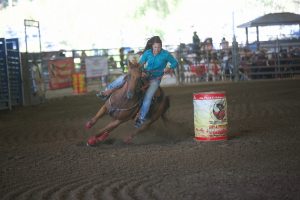
Barrel Racer (Photo by Ed Miller)
“It was from ‘Gunsmoke,’” Miss Kitty said, referring to the classic TV western. “There was only one woman on the show – Miss Kitty. And often, I was the only woman at these rodeos. So, people started calling me that. I hated it.”
That only added fuel to the fire, she continued.
“I used to cry,” she added. “And when people find out something like that bothers you, that’s when they really pick at you.”
Stuck with a nickname she hated, she adapted and made it work for her.
“It spread like wildfire to the point where I just had to go on and accept it,” Miss Kitty said. “If I was trying to call (the Mayor’s office) and used my real name, they were like, ‘Who?’ But when I said, ‘Miss Kitty,’ they knew who I was.
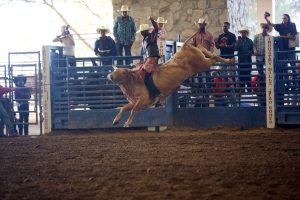
Bull Rider (Photo by Ed Miller)
“I didn’t name me that,” she said. “Memphis named me that.”
For 28 years, Miss Kitty has brought the Bill Pickett Rodeo to Memphis, and she’s always made sure to mix education in with entertainment. Rodeo events routinely include the “Rodeo for Kidz Sake,” which exposes youngsters to animals, cowboys and cowgirls. “The kids show (In Memphis) is sold out. I could have done two kids shows this year,” she said.
The rodeo experience teaches the kids about the importance of Black Americans in the development of the West.
“When I started working with rodeos, I had to dig to find information about the Buffalo Soliders,” Miss Kitty said, referring to the historic. “Nobody knew about them. We’re creating an awareness about this history.”
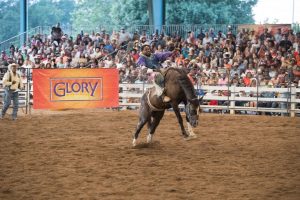
Bareback Rider (Photo:Ccyril Bailleul)
The main event – playfully named “The Greatest Show on Dirt” — is the rodeo itself. Thousands of spectators gather to watch black cowboys and cowgirls compete in eight major rodeo events. Among them (abbreviations intact): Bare Back Ridin’, Bull Doggin’, Calf Ropin’, Steer Undecoratin’, Barrel Racin’, Kid’s Calf Scramblin’, Relay Racin’, and Bull Ridin’.
“Nobody ever leaves disappointed,” she said.
Miss Kitty said that though she extends invitations to schools all around the Mid-South, the only schools to respond are typically in Memphis and Shelby County. Which is a shame, she said.
“You can’t force somebody to participate,” Miss Kitty said. “All you can do is invite them.
“I don’t understand why little white children don’t get to learn about this history.”
#NNPA BlackPress
A Nation in Freefall While the Powerful Feast: Trump Calls Affordability a ‘Con Job’
BLACKPRESSUSA NEWSWIRE — There are seasons in this country when the struggle of ordinary Americans is not merely a condition but a kind of weather that settles over everything.

By Stacy M. Brown
Black Press USA Senior National Correspondent
There are seasons in this country when the struggle of ordinary Americans is not merely a condition but a kind of weather that settles over everything. It enters the grocery aisle, the overdue bill, the rent notice, and the long nights spent calculating how to get through the next week. The latest numbers show that this season has not passed. It has deepened.
Private employers cut 32,000 jobs in November, according to ADP. Because the nation has been hemorrhaging jobs since President Trump took office, the administration has halted publishing the traditional monthly report. The ADP report revealed that small businesses suffered the heaviest losses. Establishments with fewer than 50 workers shed 120,000 positions, including 74,000 from companies with 20 to 49 workers. Larger firms added 90,000 jobs, widening the split between those rising and those falling.
Meanwhile, wealth continues to climb for the few who already possess most of it. Federal Reserve data shows the top 1 percent now holds $52 trillion. The top 10 percent added $5 trillion in the second quarter alone. The bottom half gained only 6 percent over the past year, a number so small it fades beside the towering fortunes above it.
“Less educated and poorer people tend to make worse mistakes,” John Campbell said to CBS News, while noting that the complexity of the system leaves many families lost before they even begin. Campbell, a Harvard University economist and coauthor of a book examining the country’s broken personal finance structure, pointed to a system built to confuse and punish those who lack time, training, or access.
“Creditors are just breathing down their necks,” Carol Fox told Bloomberg News, while noting that rising borrowing costs, shrinking consumer spending, and trade battles under the current administration have left owners desperate. Fox serves as a court-appointed Subchapter V trustee in Southern Florida and has watched the crisis unfold case by case.
During a cabinet meeting on Tuesday, Trump told those present that affordability “doesn’t mean anything to anybody.” He added that Democrats created a “con job” to mislead the public.
However, more than $30 million in taxpayer funds reportedly have supported his golf travel. Reports show Kristi Noem and FBI Director Kash Patel have also made extensive use of private jets through government and political networks. The administration approved a $40 billion bailout of Argentina. The president’s wealthy donors recently gathered for a dinner celebrating his planned $300 million White House ballroom.
During an appearance on CNBC, Mark Zandi, an economist, warned that the country could face serious economic threats. “We have learned that people make many mistakes,” Campbell added. “And particularly, sadly, less educated and poorer people tend to make worse mistakes.”
#NNPA BlackPress
The Numbers Behind the Myth of the Hundred Million Dollar Contract
BLACKPRESSUSA NEWSWIRE — Odell Beckham Jr. did not spark controversy on purpose. He sat on The Pivot Podcast and tried to explain the math behind a deal that looks limitless from the outside but shrinks fast once the system takes its cut.

By Stacy M. Brown
Black Press USA Senior National Correspondent
Odell Beckham Jr. did not spark controversy on purpose. He sat on The Pivot Podcast and tried to explain the math behind a deal that looks limitless from the outside but shrinks fast once the system takes its cut. He looked into the camera and tried to offer a truth most fans never hear. “You give somebody a five-year $100 million contract, right? What is it really? It is five years for sixty. You are getting taxed. Do the math. That is twelve million a year that you have to spend, use, save, invest, flaunt,” said Beckham. He added that buying a car, buying his mother a house, and covering the costs of life all chip away at what people assume lasts forever.
The reaction was instant. Many heard entitlement. Many heard a millionaire complaining. What they missed was a glimpse into a professional world built on big numbers up front and a quiet erasing of those numbers behind the scenes.
The tax data in Beckham’s world is not speculation. SmartAsset’s research shows that top NFL players often lose close to half their income to federal taxes, state taxes, and local taxes. The analysis explains that athletes in California face a state rate of 13.3 percent and that players are also taxed in every state where they play road games, a structure widely known as the jock tax. For many players, that means filing up to ten separate returns and facing a combined tax burden that reaches or exceeds 50 percent.
A look across the league paints the same picture. The research lists star players in New York, Philadelphia, Chicago, Detroit, and Cleveland, all giving up between 43 and 47 percent of their football income before they ever touch a dollar. Star quarterback Phillip Rivers, at one point, was projected to lose half of his playing income to taxes alone.
A second financial breakdown from MGO CPA shows that the problem does not only affect the highest earners. A $1 million salary falls to about $529,000 after federal taxes, state and city taxes, an agent fee, and a contract deduction. According to that analysis, professional athletes typically take home around half of their contract value, and that is before rent, meals, training, travel, and support obligations are counted.
The structure of professional sports contracts adds another layer. A study of major deals across MLB, the NBA, and the NFL notes that long-term agreements lose value over time because the dollar today has more power than the dollar paid in the future. Even the largest deals shrink once adjusted for time. The study explains that contract size alone does not guarantee financial success and that structure and timing play a crucial role in a player’s long-term outcomes.
Beckham has also faced headlines claiming he is “on the brink of bankruptcy despite earning over one hundred million” in his career. Those reports repeated his statement that “after taxes, it is only sixty million” and captured the disbelief from fans who could not understand how money at that level could ever tighten.
Other reactions lacked nuance. One article wrote that no one could relate to any struggle on eight million dollars a year. Another described his approach as “the definition of a new-money move” and argued that it signaled poor financial choices and inflated spending.
But the underlying truth reaches far beyond Beckham. Professional athletes enter sudden wealth without preparation. They carry the weight of family support. They navigate teams, agents, advisors, and expectations from every direction. Their earning window is brief. Their career can end in a moment. Their income is fragmented, taxed, and carved up before the public ever sees the real number.
The math is unflinching. Twenty million dollars becomes something closer to $8 million after federal taxes, state taxes, jock taxes, agent fees, training costs, and family responsibilities. Over five years, that is about $40 million of real, spendable income. It is transformative money, but not infinite. Not guaranteed. Not protected.
Beckham offered a question at the heart of this entire debate. “Can you make that last forever?”
#NNPA BlackPress
FBI Report Warns of Fear, Paralysis, And Political Turmoil Under Director Kash Patel
BLACKPRESSUSA NEWSWIRE — Six months into Kash Patel’s tenure as Director of the Federal Bureau of Investigation, a newly compiled internal report from a national alliance of retired and active-duty FBI agents and analysts delivers a stark warning about what the Bureau has become under his leadership.

Six months into Kash Patel’s tenure as Director of the Federal Bureau of Investigation, a newly compiled internal report from a national alliance of retired and active-duty FBI agents and analysts delivers a stark warning about what the Bureau has become under his leadership. The 115-page document, submitted to Congress this month, is built entirely on verified reporting from inside field offices across the country and paints a picture of an agency gripped by fear, divided by ideology, and drifting without direction.
The report’s authors write that they launched their inquiry after receiving troubling accounts from inside the Bureau only four months into Patel’s tenure. They describe their goal as a pulse check on whether the ninth FBI director was reforming the Bureau or destabilizing it. Their conclusion: the preliminary findings were discouraging.
Reports Describe Widespread Internal Distrust and Open Hostility Toward President Trump
Sources across the country told investigators that a large number of FBI employees openly express hostility toward President Donald Trump. One source reported seeing an “increasing number of FBI Special Agents who dislike the President,” adding that these employees were exhibiting what they called “TDS” and had lost “their ability to think critically about an issue and distinguish fact from fiction.” Another source described employees making off-color comments about the administration during office conversations.
The sentiment reportedly extends beyond domestic lines. Law enforcement and intelligence partners in allied countries have privately expressed fear that the Trump administration could damage long-term international cooperation according to a sub-source who reported those concerns directly to investigators.
Pardon Backlash and Fear of Retaliation
The President’s January 20 pardons of individuals convicted for their roles in the January 6 attack ignited what the report calls demoralization inside the Bureau. One FBI employee said they were “demoralized” that individuals “rightfully convicted” were pardoned and feared that some of those individuals or their supporters might target them or their family for carrying out their duties. Another source described widespread anger that lists of personnel who worked on January 6 investigations had been provided to the Justice Department for review, noting that agents “were just following orders” and now worry those lists could leak publicly.
Morale In Decline
Morale among FBI employees appears to be sinking fast. There were a few scattered positive notes, but the weight of the reporting describes morale as low, bad, or terrible. Agents with more than a decade of service told investigators they feel marginalized or ignored. Some are counting the days until they can retire. One even uses a countdown app on their phone.
Culture Of Fear
Layered over that unhappiness is something far more corrosive. A culture of fear. Sources say Patel, though personable, created mistrust from the start because of harsh remarks he made about the FBI before taking office. Agents took those comments personally. They now work in an atmosphere where employees keep their heads down and speak carefully. Managers wait for directions because they are afraid a wrong move could cost them their jobs. One source said agents dread coming to work because nobody knows who will be reassigned or fired next.
Leadership Concerns
The report also paints a picture of leaders unprepared for the jobs they hold. Multiple sources said Patel is in over his head and lacks the breadth of experience required to understand the Bureau’s complex programs. Some said Deputy Director Dan Bongino should never have been appointed because the role requires deep institutional knowledge of FBI operations. A sub-source recounted Bongino telling employees during a field office visit that “the truth is for chumps.” Employees who heard it were stunned and offended.
Social Media and Communication Breakdowns
Communication inside the Bureau has become another source of frustration. Sources said Patel and Bongino spend too much time posting on social media and not enough time communicating with employees in clear and official ways. Several told investigators they learn more about FBI operations from tweets than from internal channels.
ICE Assignments Raise Alarm
Nothing has sparked more frustration inside the FBI than the orders requiring agents to assist Immigration and Customs Enforcement. The reporting shows widespread resentment and fear over these assignments. Agents say they have little training in immigration law and were ordered into operations without proper planning. Some said they were put in tactically unsafe positions. They also warned that being pulled away from counterterrorism and counterintelligence investigations threatens national security. One sub-source asked, “If we’re not working CT and CI, then who is?”
DEI Program Removal
Even the future of diversity programs became a point of division. Some agents praised Patel’s removal of DEI initiatives. Others said the old system left them afraid to speak honestly because they worried about being labeled racist. The reporting shows a deep and unresolved conflict over whether DEI strengthened the organization or weakened it.
Notable Incidents
The document also details several incidents that have become part of FBI lore. Patel ordered all employees to remove pronouns and personal messages from their email signatures yet used the number nine in his own. Agents laughed at what they saw as hypocrisy. In another episode, FBI employees who discussed Patel’s request for an FBI-issued firearm were ordered to take polygraph examinations, which one respected source described as punitive. And in Utah, Patel refused to exit a plane without a medium-sized FBI raid jacket. A team scrambled to find one and finally secured a female agent’s jacket. Patel still refused to step out until patches were added. SWAT members removed patches from their own uniforms to satisfy the demand.
A Bureau at a Crossroad
The Alliance warns that the Bureau stands at a difficult crossroads. They write that the FBI faces some of the most daunting challenges in its history. But even in despair, a few voices say something different. One veteran source said “It is early, but most can see the mission is now the priority. Case work and threats are the focus again. Reform is headed in the right direction.”
-

 Activism4 weeks ago
Activism4 weeks agoDesmond Gumbs — Visionary Founder, Mentor, and Builder of Opportunity
-

 Activism4 weeks ago
Activism4 weeks agoFamilies Across the U.S. Are Facing an ‘Affordability Crisis,’ Says United Way Bay Area
-

 Alameda County4 weeks ago
Alameda County4 weeks agoOakland Council Expands Citywide Security Cameras Despite Major Opposition
-

 Alameda County4 weeks ago
Alameda County4 weeks agoBling It On: Holiday Lights Brighten Dark Nights All Around the Bay
-

 Activism4 weeks ago
Activism4 weeks agoBlack Arts Movement Business District Named New Cultural District in California
-

 Activism4 weeks ago
Activism4 weeks agoLu Lu’s House is Not Just Toying Around with the Community
-

 Activism4 weeks ago
Activism4 weeks agoOakland Post: Week of December 17 – 23, 2025
-

 Black History3 weeks ago
Black History3 weeks agoAlfred Cralle: Inventor of the Ice Cream Scoop























































1 Comment